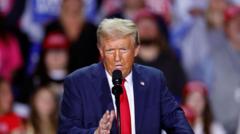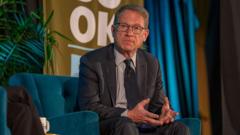In a legal brief submitted to the court, Trump expressed his opposition to the TikTok ban and emphasized the need for time to find a political resolution as he prepares for his upcoming administration.
Trump Seeks Supreme Court Delay on TikTok Ban Amidst Political Maneuverings

Trump Seeks Supreme Court Delay on TikTok Ban Amidst Political Maneuverings
Former President Trump has called for the U.S. Supreme Court to postpone a looming ban on TikTok, prioritizing a political approach to resolving the matter.
In his quest for a delay, Trump argued that the situation reflects "an unprecedented, novel, and difficult tension between free-speech rights" and national security. The Supreme Court is set to hear arguments on January 10 regarding a law compelling TikTok's Chinese parent company, ByteDance, to divest or face a ban by January 19. The law stems from accusations linking ByteDance to the Chinese government, a claim the company denies.
TikTok has filed several legal challenges against this law, asserting that it undermines free speech protections, but these have largely met with little success. With no buyers in sight for the company, January 10 represents its last chance to contest the ban directly with the high court’s intervention, which has previously denied requests for emergency injunctions.
A coalition of state attorneys general and federal authorities has urged the Supreme Court to affirm the law, citing national security risks associated with TikTok's operations. Trump's legal strategy seeks to create breathing space for a political solution, recognizing the significant tension between government concerns and individual rights.
Although he previously supported similar bans during his presidency, Trump stated he now views TikTok favorably, noting its popularity among young voters—a demographic he believes could be instrumental in his political aspirations. His remarks illustrate a shift in perspective, as he navigates the intricate dynamics surrounding social media, national security, and free speech in contemporary politics.
TikTok has filed several legal challenges against this law, asserting that it undermines free speech protections, but these have largely met with little success. With no buyers in sight for the company, January 10 represents its last chance to contest the ban directly with the high court’s intervention, which has previously denied requests for emergency injunctions.
A coalition of state attorneys general and federal authorities has urged the Supreme Court to affirm the law, citing national security risks associated with TikTok's operations. Trump's legal strategy seeks to create breathing space for a political solution, recognizing the significant tension between government concerns and individual rights.
Although he previously supported similar bans during his presidency, Trump stated he now views TikTok favorably, noting its popularity among young voters—a demographic he believes could be instrumental in his political aspirations. His remarks illustrate a shift in perspective, as he navigates the intricate dynamics surrounding social media, national security, and free speech in contemporary politics.





















